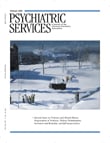Patients With Substance Abuse Problems: Effective Identification, Diagnosis, and Treatment
I am not sure I would have given this book this title. I would have titled the book Patients With Substance Abuse and Dependence Problems . The proper way to label these issues is not as alcohol, tobacco, and drugs, but as alcohol, tobacco, and other drugs. The focus is not substance abuse problems but substance abuse and dependence problems. Having said that, Nace and Tinsley's work is a 200-page clinical reference written not only for addiction psychiatrists but also for any clinician interested in working with addiction issues. It is an excellent tool for any resident, student, or addictions specialist to keep within easy arm's reach. The text is clinically sound and up to date. Its price is well within reach of most professionals, students, and libraries.
Both authors have much clinical experience with addiction psychiatry and are able to speak cogently on the subject. They help the reader focus on the patient's understanding and motivation in regard to addressing his or her abuse or addiction problems. Nace and Tinsley succeed in providing a good, current medical review of addiction and sound guidelines to identify, diagnose, and treat this spectrum of disorders.
Nace and Tinsley write in the hopes that their text will allow nonspecialists in primary care and psychiatric practices to treat addicted patients. Beyond the basics, they provide insight into many subtopics. They give a good overview of two special groups—adolescents and the elderly. They provide an up-to-date chapter on pharmacological treatment and use highlights and short cases throughout the book to add to the text's effectiveness. The glossary, appendix, and reference sections are thorough.
I plan to keep this hardcover next to my DSM to use as a reference. Occasionally, if someone borrows a book from me, I do not care if I get it back. However, with this book, I will look to have it returned.



